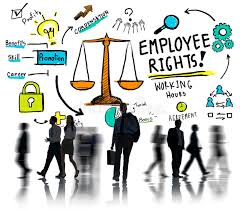
Key Takeaways
Table of Contents
Every employee, regardless of their industry or role, should have a clear understanding of their workplace rights and responsibilities. Not only does this knowledge help foster a safer and fairer work environment, but it also empowers employees to take action if issues arise. If you ever need legal protection or guidance, consulting the best employment lawyers in Colorado Springs can be invaluable in safeguarding your interests and advocating for a just working environment.
A solid grasp of what you are entitled to—and what is expected of you—lays a foundation for professional growth, job satisfaction, and confidence. This article explores the most critical workplace rights and duties, helping you steer workplace challenges with clarity and resilience.

Right to a Safe and Healthy Workplace
Every worker has a fundamental right to a safe and healthy working environment. U.S. law, under the Occupational Safety and Health Administration (OSHA), requires employers to provide workplaces free from serious recognized hazards. This includes ensuring proper safety training, access to necessary protective equipment, regular workplace assessments, and taking reasonable steps to protect both physical and mental health. If a potential hazard is identified, employees should report it immediately, and employers must act transparently to address concerns.
Addressing Physical and Mental Health
A safe workplace is not limited to physical hazards. Increasingly, companies are recognizing the importance of mental health. Employers may offer resources like counseling services, stress management training, or flexible working arrangements to support employee well-being.
Right to Fair Compensation and Benefits
Employees have the legal right to fair compensation, which encompasses more than just receiving a paycheck. This means earning at least the federal or state minimum wage (whichever is higher), receiving overtime pay for additional hours worked, and accessing any agreed-upon benefits such as health insurance, paid time off, or retirement plans. Equal pay for equal work is also a crucial aspect, and wage discrimination based on gender, race, or other protected characteristics is prohibited by the Equal Pay Act and Title VII of the Civil Rights Act.
Accurate Payment and Timely Benefits
Employees should be vigilant in reviewing their pay stubs and benefits statements to ensure they are receiving appropriate compensation. If discrepancies arise, they should be reported promptly. The U.S. Department of Labor's Wage and Hour Division outlines all relevant federal wage rights and benefits.
Right to Non-Discrimination and Harassment-Free Environment
No employee should face discrimination or harassment at work. Federal laws such as the Civil Rights Act, the Americans with Disabilities Act, and the Age Discrimination in Employment Act protect workers from unfair treatment based on race, color, religion, sex, national origin, age, disability, or genetic information. Similarly, protections exist at the state level, often extending to additional categories. Harassment, whether verbal, physical, or digital, is also strictly prohibited and can create a hostile work environment if left unaddressed.
Responding to Discrimination or Harassment
If subjected to discrimination or harassment, employees are encouraged to document incidents and report them to HR or the designated internal authority. External bodies such as the Equal Employment Opportunity Commission (EEOC) can also investigate claims. Both victims and bystanders have a right to a respectful workplace and should support one another in reporting unacceptable behavior.
Right to Privacy
The right to privacy in the workplace is an evolving aspect of employment law. While employers have legitimate interests in monitoring work performance and protecting company assets, they are required to balance this with respect for employees' personal information and activities. Limits apply to surveillance, background checks, and access to records, and employees should be informed if monitoring is taking place.
Personal Data and Communication Boundaries
Employers must keep employee records confidential, use data responsibly, and acquire consent when appropriate. Sensitive information—like medical or financial details—should be especially protected, and excessive or unwarranted surveillance (such as monitoring personal devices without need or consent) can run afoul of the law.
Employee Responsibilities
With rights come responsibilities. Employees are expected to adhere to company policies, including attendance, punctuality, and codes of conduct. They must respect colleagues, supervisors, and clients, and perform job duties in good faith. Following health and safety protocols, reporting hazards or misconduct, and keeping company information confidential all support a productive and respectful workplace. Fulfilling these duties not only builds trust but also helps prevent workplace disputes and legal issues.
Maintaining Professionalism and Integrity
Employees should communicate openly, raise concerns appropriately, and seek clarity if unsure about any workplace policy. Upholding standards of professionalism fosters a positive environment and promotes mutual accountability among the workforce.
Conclusion
A well-informed workforce is empowered to thrive. By understanding your workplace rights—such as the right to safety, fair compensation, privacy, and freedom from discrimination—and by embracing your responsibilities, you help create a community built on trust, respect, and shared success. Whether you’re facing a workplace issue or simply want to stay informed, resources from reputable organizations like OSHA and the EEOC, as well as guidance from knowledgeable legal professionals, remain critical supports along your career journey.

This post has been published by the admin of our website, responsible for content management, quality checks, and providing valuable information to our users.


